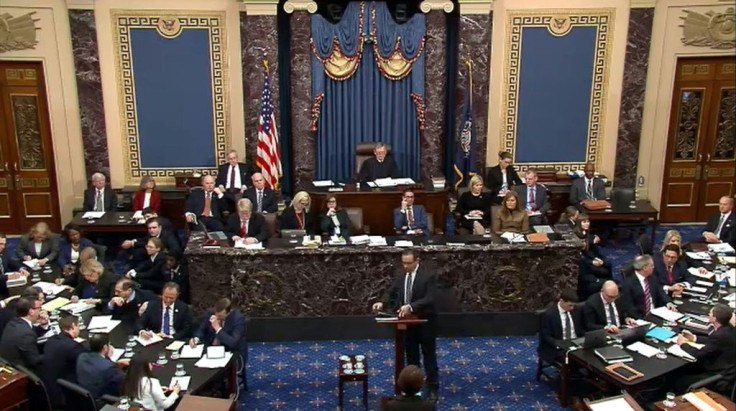Trump Budget Cuts Funding Of Medicaid, Food Stamps; Adds $2 Billion For Border Wall

KEY POINTS
- Trump's proposed 2021 budget cuts federal spending for social safety nets protecting average Americans
- It wants deep cuts in spending on food stamps and federal disability benefits
- It will increase funding for Trump's border wall with Mexico and for the U.S. military
House Democrats are expected to reject outright parts of president Donald Trump's new budget that would dismantle the country's vast social safety nets such as Medicaid, while increasing funding to build more of Trump's border wall with Mexico and boosting the already enormous amounts spent on the U.S. military.
Trump's $4.8 trillion budget proposal for fiscal year 2020-2021 essentially wants to eliminate the federal budget deficit by 2035 by resorting to deep spending cuts in social programs for Americans and among federal government agencies.
Trump aims to cut $4.4 trillion in spending over a decade, including deep cuts in spending on food stamps and federal disability benefits. Most of the savings will stem from the administration’s push to limit food stamp benefits and decrease Medicaid spending.
Trump also wants deep cuts to a number of federal agency budgets. Among the departments to be hit will be the Department of Housing and Urban Development (15% cut), the Environmental Protection Agency (26%) and the U.S. Centers for Disease Control and Prevention (9%). Analysts said both chambers of Congress are unlikely to support these cuts.
To be rejected outright by House Democrats will be the extra $2 billion Trump wants for the Mexico border wall construction, and billions in funding hikes for immigration enforcement.
Total cuts to "non-defense discretionary programs,” which don't include Medicare or Social Security, amount to $2 trillion under the proposed budget. Foreign aid will be reduced by 21% to support Trump's "America First" foreign policy.
Money spent on security, both domestic and foreign, will grow. The budget for the Department of Homeland Security, which enforces Trump's immigration policies, will increase 3%. The Department of Defense will see a 0.3% increase in military spending to $740.5 billion. The budget for the National Nuclear Security Administration (NSSA) will get a 19% boost while and the Department of Veterans Affairs will see its budget rise by 13%. NNSA maintains and enhances the safety, security, and effectiveness of the U.S. nuclear weapons stockpile.
The federal budget deficit will exceed $1 trillion this year due to the tax cuts given to businesses and wealthy Americans by the Republican Party's Tax Cuts and Jobs Act passed in December 2017. The huge revenue losses triggered by these tax cuts were aggravated by declining federal tax revenues. Business firms that benefited enormously from the tax cuts haven't reinvested their profits in business but have instead resorted to stock buybacks that have enriched their shareholders.

© Copyright IBTimes 2024. All rights reserved.





















